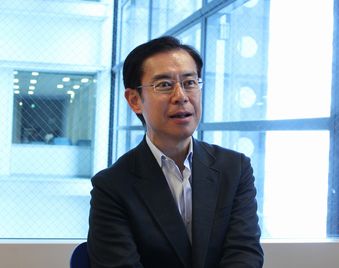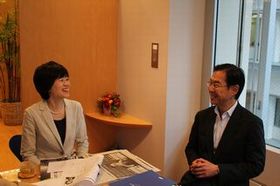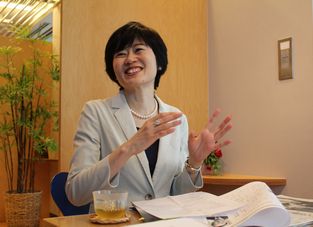-
Conversations with People and Topics of Focus
Abitus thinks ahead, Globalized Human Resources
The importance of globalized human resources is becoming increasingly greater in Japan, as seen through the appearance of companies here that use English as their official in-house language. Abitus, an industry leader that started a course in Japan for U.S. Certified Public Accountant (CPA) certification 17 years ago, can be considered a Japanese pioneer in global human resources development.
In this issue’s interview and dialogue series hosted by Arc Communications President & CEO Mariko Ohsato, the guest is Toyoaki Miwa, President of Abitus, Inc.
Mariko Ohsato and Mr. Miwa, who left their jobs and started their own businesses at around the same time, are friends of long standing. Today she asked him to talk about a topic of which he has not spoken much before—what it is like behind the scenes of Abitus’ success. Why did he decide to offer a course for an American certification in Japan? What is the objective of their latest business—a Japanese language school? What are the qualities going forward that will be required of globalized human resources? This dialogue shows promise of being quite interesting.
Business Start-up Triggered by Own Decision to Become a CPA

Ohsato: The importance of globalized human resources is now starting to be taken up by the media, but it is something that caught your attention quite some time ago. You started a business focusing on this thinking that the term “globalized human resources” means not just an individual’s strengths in the English language but in other areas as well.
T. Miwa: Yes, the core course at Abitus is one for acquiring a U.S. certified public accountant (CPA) certification. The program, which was launched in 1995, has been supported by people in their late twenties and mid-thirties who want to acquire specialized knowledge and qualifications in addition to language skills. Since then, we have sequentially launched a course for becoming a U.S. certified lawyer and a U.S. MBA program. In the sense that these courses allow you to acquire a U.S. certification in Japan, they are services with the same concept.
Ohsato: How did you come up with the idea of starting a course for obtaining a U.S. CPA certification in the first place?
T. Miwa: After I quit the company that I had been working for, I was trying to figure out what to do next. It occurred to me that I should get a U.S. CPA certification. But, when I started looking into it, I realized that I couldn’t find a good course that I could take in Japan. That’s why I thought that it had the potential of becoming a good business to launch.
Ohsato: You mean, you wanted to become an accountant?
T. Miwa: Yes I did. In fact, I did obtain CPA certification, but I got too busy launching the CPA course, so I didn’t become an accountant after all (laughs).
Managing a Japanese Language School, a Strategic Move towards Abitus’ Advance into China
Ohsato: This year, you started a Japanese language school called the Tokyo Central Japanese Language School. How did this come about?T. Miwa: To tell you the truth, I was feeling that I had already covered the main qualifications in the U.S. in my business and that there was no more that could be done in that area. However, as a business owner, I couldn’t allow things to stay at a standstill. So, this time, I thought I could provide something from Japan to people overseas, and the result was a Japanese language school. You may think it surprising, but there is a huge demand in countries like China and Taiwan for human resources who can carry out business with Japan and Japanese companies. In fact, I’ve heard that people who can speak Japanese are paid higher than those who can speak English. I feel that the market worth of people who have studied abroad in Japan, who are the minority, is higher than the market worth of people who studied in the U.S., who are far greater in number.
Ohsato: So, you have many students from China?
T. Miwa: We currently have students with us from 31 countries, and 60% of them are from China. Next in number are students from Taiwan. There are an astounding number of people in China and Taiwan who are studying Japanese. The base population is large, so it becomes a very big number. There are also students from Europe and the U.S., but the core of them is from Asia.
Ohsato: The news from Europe regarding the economy is rather bleak, so you get the sense that there is even greater focus being placed on Asia.
T. Miwa: Exactly. Years ago, I think many people went to the U.S. and Europe on business trips, but now, they go on business trips to Asia. In fact, if it’s somewhere like Shanghai or Dalian, it probably wouldn’t feel all that much different than going on a domestic business trip. Aside from China, there’s Taiwan, Vietnam, Thailand, Singapore and the Philippines—all of them are attractive as a country. However, there’s another major reason why we started a Japanese language school. That is, it is a preparatory step for selling Abitus’ specialty – that is, courses for acquiring U.S. qualifications – in China. I am certain that there is a market for them in China. However, there aren’t any grounds right now for convincing people where the added value is in having Abitus, a Japanese company, sell U.S. certification courses in China. That’s why we wanted to start by opening a Japanese language school, which accepts students from Asia, so that we could create a pipeline with Asian educational institutes.
Ohsato: I see. I will be looking forward to seeing how things develop from here. Mr. Miwa, do you go out yourself to explore new markets?
T. Miwa: I certainly do. I spend more than half of the month visiting various regions in Asia. I’ve developed quite some local connections because I go so frequently.
Ohsato: You really are very light on your feet. I bet your Chinese has gotten pretty good, too!
T. Miwa: Yes, it has. In fact, I’ve really buckled down on learning Chinese this year (laughs). Speaking English is sufficient for business talks, but, for example, if I go out to dinner with the local people, they really like it when I speak a bit of Chinese. That kind of communication can sometimes build trust, too.
Ohsato: Actually, Arc Communications is thinking of a business targeting overseas students, too. With schools like Waseda University and Ritsumeikan University at the head of the list, the adoption of programs that allow students to earn degrees just through courses in English is progressing in Japan. That means there will be an increase in the number of international students here. The concept is to provide services to such students.
T. Miwa: That’s quite interesting. Is the target Asian students?
Ohsato: Yes, I think it would be Asian students.
T. Miwa: So, then, it would be the same target as the one we are trying to develop—Chinese university students.
Ohsato: Can I join you on your next business trip to China (laughs)?
T. Miwa: Yes, of course, please do! I think it would make for a fun trip (laughs).
The Qualities Required of Globalized Human Resources Who Take on the World

Ohsato: The demand for globalized human resources is becoming even bigger. What do you think the qualities required of globalized human resources are?
T. Miwa: Language skills are of course important, but I’m beginning to think that what’s important in language is not so much the pronunciation or grammar—they don’t have to be perfect so long as the other person understands what you want to say. A Japanese businessman that I met in China said something interesting to me. He said, “If you go on a business trip up north, just make an excuse and say, ‘I learned my Chinese in the south,’ and when you go south, tell them ‘I learned my Chinese in the north’“ (laughs).
Ohsato: This is something that can also be said about me, but I think Japanese people are too much of a perfectionist. Good pronunciation and proper grammar are important, but when doing business, the most important objective is to be understood.
T. Miwa: That’s right. I also think that if you want to be active on the global stage, you should be thinking of a timeline—what you should do while you’re in your 20s, what you should do in your 30s, and so on. I think the thinking of acquiring language skills and specialized knowledge between your 20s and 30s is going to become even more common going forward. There are many ways to acquire qualifications and careers other than by becoming a U.S. certified public accountant. I think we’re in an age when each individual can demonstrate his or her strengths in a field that he or she aspires to by accumulating global knowledge.
Ohsato: What are your thoughts on the globalization of the seasoned generation—the veterans?
T. Miwa: Once one is in his or her 40s or 50s, the ability as administrator to manage foreigners becomes a requirement. In particular, from now on, people will find more and more that they have people from other parts of Asia as his or her subordinates. This may of course be the case while in Japan, but you may also be asked to relocate to Beijing or Shanghai and find yourself working in a management position there. Each country has its own customs and way of thinking. Will the knowledge of a language be enough for a person to be able to serve well as an administrator? No, I don’t think so. General management skills are what become necessary as a globalized human resource.
Ohsato: Japan needs to take leadership in Asia, don’t you think?
T. Miwa: Exactly. They say that there is no vitality in Japan, but each country has its own problems. If you look at Japan overall, you will see that Japan isn’t in a bad position in any way. I truly believe that there is no need to be pessimistic at all. There are many things that we should be proud of about Japan—beautiful cities; disciplined people who follow rules; clean, state-of-the-art factories; technological capabilities; and the reliability of products made in Japan. These are all a part of an admirable Japanese culture.
One of the missions of globalized human resources is to understand the good points of their home country and to communicate those points while conducting business overseas. When we think about Japanese culture, we tend to focus on the arts, such as the tea ceremony and flower arrangement. However, there are many other elements of Japanese culture in the business realm that I would like to communicate to the world. I would like to be able to tackle new things with greater confidence and with my head held high. After all, while the markets in Japan become smaller due to the declining birthrate and an aging population, the markets in the rest of Asia are becoming even larger, and we have no choice but to look outward towards such markets.
Ohsato: When we think of people in Asia who are globally active, the activities of people from areas like Singapore as well as the overseas Chinese stand out. From now on, however, I hope to see more from Japanese globalized human resources. I think that even among the Japanese, the young generation has a very global outlook. I feel a high awareness among the young generation of a need to acquire another language in addition to English.
T. Miwa: That’s very good.
Ohsato: I think that in another 10 years, there will be many Japanese people who speak multiple languages and have global business skills for being active locally in other part of Asia. Change is taking place at an incredible rate, so I have to make sure that I don’t get left behind (laughs).
T. Miwa: Yes, people want personnel that will be recognized for their talents locally in other parts of Asia, and I think there is no question that such people will increase in number.

Ohsato: Well, here’s my last question. What is the strength required to compete globally? What do you think your own strengths are, Mr. Miwa; what is your analysis?
T. Miwa: I think more than anything it is that I “like” it. I think I like creating an organization that achieves global growth—that I like working with different cultures and people from many different countries. What if we were to relocate Abitus headquarters to Hong Kong? I bet it would be great fun, and I get excited just thinking about it. Looking back, when I was a university student, I spent one year as an exchange student at the University of California, Santa Barbara. Perhaps it is that I can’t forget the fun I had then, the excitement I felt doing things with overseas people.
Ohsato: You really do look happy when you are overseas. I have much to learn from you regarding your passion for advancing your business to overseas markets as well as your stupendous footwork. Thank you very much for your time and for sharing your valuable thoughts with us today.
Toyoaki MiwaPresident, Abitus, Inc.; U.S. Certified Public AccountantBorn in Tokyo. Graduated from Tohoku University, Department of Economics. Joined Daiwa Securities in 1988. Joined Uniden in 1989. Founded the U.S. Education Network (now Abitus) after leaving Uniden in 1994. Currently serving concurrently since 2012 as the head of the Tokyo Central Japanese Language School. -
Conversations with People and Topics of Focus
Back Numbers
- Abitus thinks ahead, Globalized Human Resources (Summer Greeting 2012)
- The Internal Communication Strategies of Multinational Japanese Companies (Summer Greeting 2011)
- Foreign-language Website Production/Website Translation (Spring Greeting 2011)
- Global/Multilingual Website Solutions (Winter Greeting 2010)
- Market Development through Global Websites (Summer Greeting 2010)
![]()
